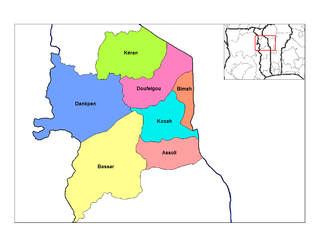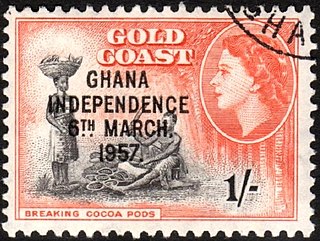
Ghana, officially the Republic of Ghana, is a country in West Africa. It lies adjacent to the Gulf of Guinea and the Atlantic Ocean to the south, sharing a border with Ivory Coast in the west, Burkina Faso in the north, and Togo in the east. Ghana covers an area of 239,567 km2 (92,497 sq mi), spanning diverse ecologies, from coastal savannas to tropical rainforests. With nearly 35 million inhabitants, Ghana is the second-most populous country in West Africa. The capital and largest city is Accra; other significant cities include Kumasi, Tamale, and Sekondi-Takoradi. In 1957 Ghana became the first colony in Sub-Saharan Africa to achieve sovereignty, under the leadership of Kwame Nkrumah.

Ghana is a country of 33.48 million people and many native groups, such as:

The Dagbamba or Dagomba are an ethnic group of Ghana, and Togo. They number more than 3.1 million people. The term Dagbamba is originally extended to refer to other related peoples who were unified by Naa Gbewaa including the Mamprusi and Nanumba. The Dagomba country is called Dagbon and they speak Dagbanli language. Dagbanli is the most spoken language of northern Ghana and second most widely spoken local language of Ghana. Dagbanli belongs to the Mabia (Mole-Dagbani) subgroup of the Gur languages, a large group of related languages in West Africa. The Dagomba practises both patrilineal and matrilineal systems of inheritance.
The Akan people are a Kwa group living primarily in present-day Ghana and in parts of Ivory Coast and Togo in West Africa. The Akan speak languages within the Central Tano branch of the Potou–Tano subfamily of the Niger–Congo family. Subgroups of the Akan people include: the Agona, Akuapem, Akwamu, Akyem, Anyi, Ashanti, Baoulé, Bono, Chakosi, Fante, Kwahu, Sefwi, Wassa, Ahanta, and Nzema, among others. The Akan subgroups all have cultural attributes in common; most notably the tracing of royal matrilineal descent in the inheritance of property, and for succession to high political office. All Akans are considered royals in status, but not all are in royal succession or hold titles.
Okomfo Anokye was the first priest (Okomfo) of the Ashanti Empire. Anokye is known for his participation in the expansion of the empire. He was also the codifier of the constitution and laws of the Ashanti Empire.

The Ashanti Region is located in the southern part of Ghana and is the third largest of 16 administrative regions, occupying a total land surface of 24,389 km2 (9,417 sq mi) and making up 10.2 percent of the total land area of Ghana. It is the most populated region in Ghana, with a population of 5,440,463 according to the 2021 census, accounting for around one-sixth of Ghana's total population. The Ashanti Region is known for its gold bar and cocoa production. The largest city and capital of Ashanti is Kumasi.

Ghana is a multilingual country in which about eighty languages are spoken. Of these, English, which was inherited from the colonial era, is the official language and lingua franca. Of the languages indigenous to Ghana, Akan is the most widely spoken in the south. Dagbani, Dagare, Sisaala, Waale, and Gonja are among the most widely spoken in the northern part of the country.

The Akyem are an Akan people. The term Akyem is used to describe a group of four states: Asante Akyem, Akyem Abuakwa, Akyem Kotoku, and Akyem Bosome. These nations are located primarily in the eastern region in south Ghana. The term is also used to describe the general area where the Akyem ethnic group clusters. The Akyem ethnic group make up between 3-4 percent of Ghana's population depending on how one defines the group and are very prominent in all aspects of Ghanaian life. The Akyem are a matrilineal people. The history of this ethnic group is that of brave warriors who managed to create a thriving often influential and relatively independent state within modern-day Ghana. When one talks of Ghanaian history, there is often mention of The Big Six. These were six individuals who played a big role in the independence of Ghana. Of the big six, people of Akyem descent made up the majority.

Dankpen is a prefecture located in the Kara Region of Togo. The prefecture covers 2 690 km2, with a population in 2022 of 185,662. The prefecture seat is located in Guérin-Kouka. It is split into 12 cantons, Guérin-Kouka, Bapuré, Nandouta, Kidjaboum, Namon, Nawaré, Katchamba, Nampoch, Natchiboré, Natchitikpi, Koulfièkou, and Koutchichéou.
Akwamu was a state set up by the Akwamu people in present-day Ghana. After migrating from Bono state, the Akan founders of Akwamu settled in Twifo-Heman. The Akwamu led an expansionist empire in the 17th and 18th centuries. At the peak of their empire, Akwamu extended 400 kilometres (250 mi) along the coast from Ouidah, Benin in the East to Winneba, Ghana, in the West.

The Asante Empire, also known as the Ashanti Empire, was an Akan state that lasted from 1701 to 1901, in what is now modern-day Ghana. It expanded from the Ashanti Region to include most of Ghana and also parts of Ivory Coast and Togo. Due to the empire's military prowess, wealth, architecture, sophisticated hierarchy and culture, the Asante Empire has been extensively studied and has more historic records written by European, primarily British, authors than any other indigenous culture of sub-Saharan Africa.

Ghana gained independence from the British on 6 March 1957. It is a member of the Commonwealth of Nations. The country became a republic on July 1, 1960.
1994 in Ghana details events of note that happened in Ghana in the year 1994.
Kwadwo/Kwadjo/Kojo is an Akan masculine given name originating from the Akan people, meaning born on a Monday. As an Akan given name, with the Akans being a large ethnic group consisting of various tribes such as the Fante, Asante, Akuapem among others, Kwadwo/Kwadjo is sometimes written as "Kojo", Kwadwo or Kwadjo and is also used less frequently as a family name. People born on particular days are supposed to exhibit the characteristics or attributes and philosophy, associated with the days. Kwadwo has the appellation Okoto or Asera meaning peace. Thus, males named Kwodwo tend to be peaceful.
Emmanuel Bombande is a conflict resolution, peacebuilding, and development professional from Accra, Ghana, and is the Chair of the Board of the Global Partnership for the Prevention of Armed Conflict.

The Konkomba people are a Gur ethnic group residing mainly in the Northern, Brong Ahafo, Volta, Eastern and Greater Accra Regions of Ghana. Saboba, Chereponi and Nanumba Districts, Gushiegu and Karaga districts, East Mamprusi, Yunyoo-Nasuan, Zabzugu and Tatale-Sanguli districts in the Northern Region and the Nkwanta North and South Districts in the Volta Region are a few examples of administrative districts where Bikpakpaam are seen in huge populations. Other key districts where Bikpakpaam are in Ghana are Atebubu, Kintampo, Techiman and Yeji in the Brong Ahafo Region. According to the Act 280 of the Anatomy act of Ghana, the Konkomba people are the second largest ethnic group in the Northern Region of Ghana.

The Nanumba people are an ethnic group whose traditional homeland is in the southeast of the Northern Region of Ghana. They speak Nanugli, a Gur language.
Konkomba–Nanumba conflict was a tribal war in Northern Ghana in 1994.

The Political history of Ghana recounts the history of varying political systems that existed in Ghana during pre-colonial times, the colonial era and after independence. Pre-colonial Ghana was made up of several states and ethnic groups whose political system was categorized by 3 main administrative models; Centralized, Non-centralized and Theocratic states. In the colonial era, the British Empire employed different forms of government among its four territorial possessions in the Gold Coast. Indirect rule was implemented in the late 19th century after its success in Northern Nigeria. From the 1940s, native Ghanaians yearned for more autonomy. This resulted in the several constitutional reforms as well as the creation of the office of the Prime Minister in 1952.










